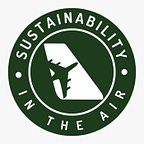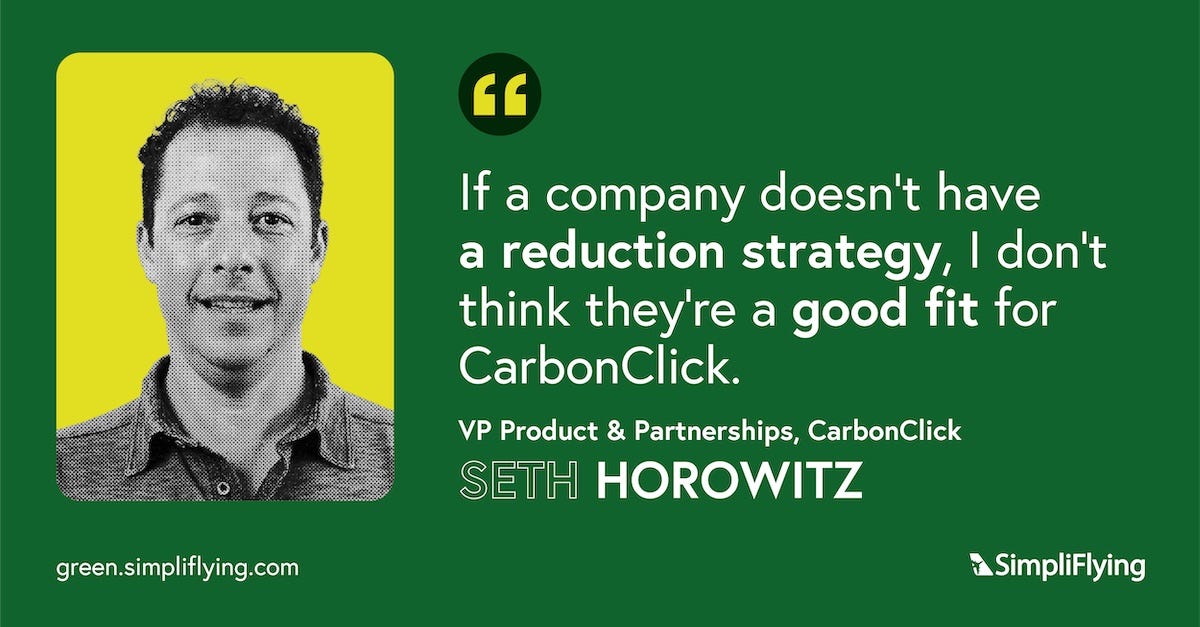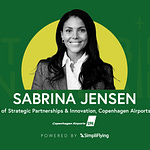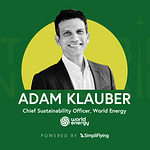Welcome to Season 3 of Sustainability in the Air, the world’s first podcast dedicated to sustainable aviation. Through in-depth conversations with top aviation leaders, we break through the clutter and provide a clear roadmap for a net-zero future.
Carbon offsetting is a frequently used solution for mitigating excessive emissions, especially in aviation. The solution, however, is not without its fair share of controversies. As an industry leader in managing and implementing transparent offsetting programs, CarbonClick helps individuals and top global airlines reduce pollution while restoring nature.
In this episode of our ‘Sustainability in the Air’ podcast, CarbonClick’s Vice President of Enterprise Product & Strategic Partnerships, Seth Horowitz speaks with SimpliFlying's CEO Shashank Nigam and shares how carbon offsets, when used carefully, can be an asset to aviation. He emphasises that offsetting must be used as the last step mitigation strategy, only after every other reduction methodology has been exhausted.
Fun fact: Horowitz actually joined CarbonClick after listening to our podcast with CarbonClick’s CEO Dave Rouse and COO Michelle Noordermeer.
You can listen and subscribe to our podcast on all major podcast platforms or read our deep dive into the episode below.
If you’re rushed for time, you can also directly jump to your topic of interest by referring to these timestamps:
Dealing with criticism of offsets (7:28)
The CarbonClick methodology (11:38)
How does the CarbonClick platform work (12:52)
Offsetting for individuals and My CarbonClick (14:50)
Reconciling the benefits of travel with the harms of air travel emissions (16:32)
Going green — incentives vs punitive methods (19:52 & 22:06)
Mandatory vs voluntary offsetting (23:45)
How to get to net zero (25:05)
Rapid Fire! (26:45)
Upset with offsets
Carbon offsetting, once a darling of businesses wishing to demonstrate their commitment to the environment, has lately fallen afoul of activists and academics. For instance, earlier this year, our Head of Sustainability, Dirk Singer, wrote about a massive investigation that was published by Germany’s Die Zeit and the UK’s Guardian newspapers, along with NGO ‘Source Material’. The latter’s press release went as far as calling carbon offsetting “The Carbon Con”.
The claim is that out of 100 million carbon credits analysed, “only a fraction of them resulted in real emissions reductions.” Moreover, one of the main claims in the report concerns the verification body Verra, one of the organisations that assesses whether carbon offsetting schemes are legitimate. Source Material accuses Verra of “rubber stamping” credits, having issued one billion of them in 15 years. One reason for that is that Source Material says that Verra issues credits for “avoided deforestation”.
To his credit, Horowitz admits that he is aware of the criticisms and increasingly poor perception of carbon offsetting as a viable sustainability pathway. In fact, to understand the criticisms as well as to be persuaded by the integrity of the business he had dived headlong into, Horowitz dug deep into understanding the business better. He began by conducting his own research using resources made available to him by the team as well as those that were publicly available.
“The first thing I had to do is reconcile whether I’m selling a product that allows companies to offset and then gives them a blank cheque to keep doing business as usual”, says Horowitz. The CarbonClick difference, Horowitz suggests, is an understanding of the broader sustainability landscape and knowing there’s no silver bullet to solve the climate crisis.
“One of the things that CarbonClick does, that I believe is important, is we tell our customers and partners that if you want to use offsets as your solution, you must first work on reduction,” he elaborates. “So if a company doesn’t have a reduction strategy, I don’t think they’re a good fit for us because we say reduce first and then mitigate the rest through offsetting.”
How CarbonClick maximises the impact of offsets
Having explored the offsetting landscape and the mechanics of the business, Horowitz believes that not all offsets are created equal. At CarbonClick, he says, there are carbon analysts who do their own selection and due diligence against the offsetting projects. “We don’t treat carbon offsets as commodity offerings; we curate a portfolio of projects that we feel are above reproach,” he says.
In order to ensure this, Horowitz says CarbonClick adheres to industry standards and verification bodies such as The Gold Standard. Above that, the company does its own additional due diligence to make sure that the projects meet CarbonClick standards for additionality and permanence. “We do our homework,” says Horowitz. “We want to make sure of the social standards of these projects as well – that there isn’t slave labour being used to manage a massive forest, for instance.”
In addition, Horowitz says the company has frank conversations internally as well as with their customers like Etihad to make sure they understand and can respond to any criticism. This also involves speaking with experts in the field in order to evaluate the criticism. “There are certain projects that are better than others. And we want to make sure we’re staying away from projects that are not the best – both in terms of perception or reality,” he explains. “So we work with them to apply the right offset projects based on science as well as perception.”
“Offsetting has to be done alongside airlines purchasing SAF, fuel and manufacturers, finding more production facilities for SAF so they can get it into the ecosystem.”
The need for intentional flying
Horowitz is refreshingly candid in confessing that as a million miler he used to be blissfully unaware of the impact of aviation. “I was one of the guys who loved chasing status and miles. Because the more you fly, the more the airline makes it a really pleasant experience,” he says. “But you know, I’m no longer unaware. And now I have this conflicting feeling.”
Ultimately, Horowitz says that he could offset his flights but he knows that is merely short-term mitigation. “What I really want to do is reduce personally,” he says. The real struggle, he explains, is that his best experiences and relationships have been formed while travelling the world. And he would wish the same for his daughter as well, to be able to form a global mindset and learn more about people from other parts of the world.
“I have this conflict between wanting to connect with the world without destroying it,” he ruminates. Horowitz suggests that intentional travel will play a big role. He mentions that the COVID-19 pandemic showed that travel could be drastically reduced and people could have wonderful experiences close to home.
“A part of it is just remembering what you can do in your own backyard. But also, instead of flying four separate trips over a period of two months, perhaps I can plan a regional visit and hit four or five customers within a week or two in order to get the most value from these trips,” he explains.
Our Take
Carbon offsetting is a contentious subject, and rightly so. It is often seen as the easy way out for companies, and is riddled with criticisms of greenwashing. To his credit, Horowitz addresses these criticisms head-on and offers a fair perspective on how CarbonClick tries to address these criticisms.
We interviewed CarbonClick’s founders Dave Rouse and Michelle Noordermeer in the first season of our podcast, where we explained the underlying mechanism of offsets and how they commodify Nature, reducing it to a “service-providing entity”. Carbon Offsetting is a market-based solution to reduce carbon emissions. Markets function through prices and in order for them to work for environmental issues, Nature and all the functions it performs (“services”) must be valued in economic terms. This reduces Nature to a “service-providing entity”1.
Moreover, carbon offsetting is a prime example of “weak sustainability”, which puts forth the idea that natural capital and manufactured capital are substitutable. Such a perspective also assumes that using up non-renewable resources or polluting the environment doesn’t matter if it leads to abundant economic prosperity. Not only is that an impractical approach, its pursuit can lead to disastrous consequences — destroying natural habitats and wreaking havoc on the entire ecosystem.
It also assumes Nature as “fungible” or composed of substitutable units that we can continue to shift around as long as the sum total remains the same. So, environmental damages (losses) caused by polluters can be balanced out by equivalent environmental gains in order to restore a balance. As an example, through carbon offsetting, carbon emissions in one location can be compensated by sequestration in another.
As the “The Carbon Con” report suggested, most offsets on the market fail to deliver on their promises. Considering the low cost and high availability of carbon offsets, it is convenient for organisations to simply continue buying offsets without focusing on actual emissions reduction. For aviation, as Horowitz himself suggested, offsetting must be the last resort. Using carbon removal offsets and focusing on long-term carbon reduction is key.
In our piece earlier this year on “The Carbon Con” fiasco, Dirk Singer recommended six principles that organisations using offsets must adhere to:
1 - Do your homework: Evaluate the impact of the programme. Does it really remove CO2? Who is certifying it? What are their certification criteria?
2 - Don’t decide on price alone: Price must not be the only criterion, especially given the number of unscrupulous operators.
3 - Avoid deforestation protection credits: It is advisable to avoid credits from these schemes for now. Instead, focus on projects that proactively capture and store CO2.
4 - Think local: Ideally, should do actual good in the area where you are based or where many of your customers are based.
5 - Be clear in your communication: Carbon offsets are not a net zero silver bullet. No advertising or marketing material should claim they are.
6 - Most importantly, work towards net zero: Offsets exist to help hard-to-decarbonise sectors like aviation, while the hard work of actually reducing industry emissions goes on in the background.
Since not all offsets are made the same, we need to be mindful of the pernicious outcomes should we choose to use them. While CarbonClick’s transparency and accountability is quite refreshing, getting to a stage where we no longer rely as much on offsetting would be great news for the planet, as Horowitz himself admits.
Our Sustainability in the Air podcast is powered by SimpliFlying which has been helping build trust in travel for over a decade.
This season of the podcast is brought to you by Cirium and CarbonClick. As a sustainability partner, Cirium helps the aviation industry gain a much clearer view of carbon emissions and develop methods to reduce them, enabling on the industry promise to fly sustainably. CarbonClick is the industry leader in managing transparent carbon offsetting programs for individuals and top global airlines.
Sullivan, S. (2013) ‘Banking Nature? The Spectacular Financialisation of Environmental Conservation’, Antipode, 45(1), pp. 198–217. doi:10.1111/j.1467-8330.2012.00989.x.














